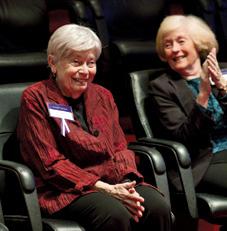Compiled by Katherine Duke ’05
 Rose Olver, left, and Helene Scher were among the first women to teach at Amherst. At a symposium this fall, they joined other female faculty members, former and current, in reflecting on their experiences.
|
In 1962, Amherst hired Rose Olver, now the L. Stanton Williams ’41 Professor of Psychology and Women’s and Gender Studies, as its first female tenure-track professor. On Oct. 1 of this year, nearing the 50th anniversary of Olver’s arrival, the college held a symposium titled “Half a Century of Women Teaching at Amherst: Gender Matters.” More than 150 people packed the Cole Assembly Room, including 60 percent of the women who taught at Amherst between 1962 and 1983. Olver was among those in the audience. Here are some remarks from the addresses and panels:
“[E]ven when we began planning this event, we had no idea that we were at yet another milestone: that Amherst was about to have its first female president—unthinkable in 1962.”
Professor of Psychology Elizabeth Aries, introducing the symposium
“I remember sitting here [at a faculty meeting] and thinking, ‘I need a tie,’ and feeling like I maybe better not sit with more than one other woman.”
Elaine Brighty, who arrived at Amherst in 1979 as the first tenure-track woman in the biology department
“My second child was born in 1977. … We had no maternity leave and no day care, so Phoebe was planned to arrive in June, and she did, but there was great concern that she might arrive early—specifically, during Commencement—[and] that my water would break on the front steps of Frost. … I marched until I got to the end of the line, and then I threw off my robe and faded into the audience.”
Jane Taubman, now professor emerita of Russian
“There was one particular group of students who decided that they wanted to call me ‘Mom,’ … and that got around among the men in my department, and I think that was really the kiss of death. … If you were liked by the students, then you must be doing something not-rigorous.”
Ruth Stark, assistant professor of chemistry from 1979 to 1985, on how her teaching style was “more nurturing” than was the norm in her department
“It was just so unbelievably important for me that [Brighty and Stark] were there, because they were the only women in the sciences that I had to look up to.”
Emily Stern ’83, on being a premed student at Amherst
“I think what many people felt offended by was the idea that there could be so many women faculty who were critical and unhappy and didn’t appreciate this institution in the way that male faculty did.”
Amrita Basu, the Domenic J. Paino 1955 Professor of Political Science and Women’s and Gender Studies, on the response to the 1984 Report of the Ad Hoc Committee to Study the Conditions of Work for Faculty Women at Amherst College. The minutes of a meeting quoted faculty describing the report as “antithetical to the life of the mind,” “propagandist” and “shrill.” The report helped to spur the creation of a women’s studies department.
“I don’t see diversity as an opportunity or a goal so much as simply a reality that one either denies, wards off or embraces.”
President Biddy Martin on her intention to help increase the diversity of the Amherst faculty
“I was one of the token women elected to the Committee of Six [the executive committee of the faculty] twice when I was untenured. … A rumor was circulating around campus that radical feminist lesbians were in cahoots to elect Gewertz.”
Deborah Gewertz, now the G. Henry Whitcomb 1874 Professor of Anthropology, who has taught at Amherst since 1977
“[H]e said, ‘This is an outrage. I am taking this to the top.’ And I said, ‘Professor So-and-So, I am the top.’”
Lisa Raskin, now the John William Ward Professor of Psychology (Neuroscience), on having a conflict with a senior faculty member during her time as dean of the faculty from 1995 to 2003
“I am so proud of my department now. In a department of nine, there are seven women.”
Patricia O’Hara, the Amanda and Lisa Cross Professor of Chemistry